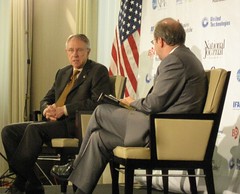Tuesday
Oct272009
Democrats In House, Senate Claim Competition Essential To Driving Down Health Costs
By Ravi Bhatia, Talk Radio News Service
Sen. Ron Wyden (D-Or.) and Reps. Anthony Weiner (D-NY) and Jim Cooper (D-Tn.) said Tuesday that infusing the health insurance market with competition would be the best way to bring down health care costs for most Americans.
“We’ve got to open up the exchanges to a broader array of people, both employers and employees,” Wyden said at a panel discussion hosted by The New Republic magazine. “That’s how we’re going to respond to people making $66,000 a year who are going to look at the [Senate] Finance Committee Bill and say that it’s not going work for [their families].”
The discussion occurred the day after Senate Majority Leader Harry Reid (D-Nev.) said that the current draft of the health care bill will include a public option with an opt-out provision for individual states. In theory, giving Americans the option to choose a government-run health care plan would drive down the costs of private insurers by creating competition. The Health Care Exchange would allow those who already have insurance to upgrade to better plans then the ones they already have using the program, further encouraging insurance companies to lower prices and raise their coverage quality standards.
“As these bills are being drafted, only ten percent of the people in America will ever be allowed to shop for any option, whether it's public or private,” Cooper said. “In other words 90 percent will be stuck with what they’ve got. So why don’t we allow people to upgrade to get a better deal?”
Cooper added, “As far as the public option is concerned, I’m for one, we can have a good one, we can have one that’s affordable for the individual family and for the system as a whole, but all this effort is for naught if we can’t get 60 votes in the Senate.”
On Tuesday, Sen. Olympia Snowe (R-Maine), who is often considered the one Republican who might vote in favor of health care reform legislation, responded to Reid’s announcement, saying that she would not support a bill that includes a public option. Sen. Joe Lieberman (I-Conn.) also announced Tuesday that he would block Reid’s plan as long as it includes a publicly funded insurance plan.
According to House Majority Leader Steny Hoyer (D-Md.), the House may introduce their health care bill by the end of this week.
Sen. Ron Wyden (D-Or.) and Reps. Anthony Weiner (D-NY) and Jim Cooper (D-Tn.) said Tuesday that infusing the health insurance market with competition would be the best way to bring down health care costs for most Americans.
“We’ve got to open up the exchanges to a broader array of people, both employers and employees,” Wyden said at a panel discussion hosted by The New Republic magazine. “That’s how we’re going to respond to people making $66,000 a year who are going to look at the [Senate] Finance Committee Bill and say that it’s not going work for [their families].”
The discussion occurred the day after Senate Majority Leader Harry Reid (D-Nev.) said that the current draft of the health care bill will include a public option with an opt-out provision for individual states. In theory, giving Americans the option to choose a government-run health care plan would drive down the costs of private insurers by creating competition. The Health Care Exchange would allow those who already have insurance to upgrade to better plans then the ones they already have using the program, further encouraging insurance companies to lower prices and raise their coverage quality standards.
“As these bills are being drafted, only ten percent of the people in America will ever be allowed to shop for any option, whether it's public or private,” Cooper said. “In other words 90 percent will be stuck with what they’ve got. So why don’t we allow people to upgrade to get a better deal?”
Cooper added, “As far as the public option is concerned, I’m for one, we can have a good one, we can have one that’s affordable for the individual family and for the system as a whole, but all this effort is for naught if we can’t get 60 votes in the Senate.”
On Tuesday, Sen. Olympia Snowe (R-Maine), who is often considered the one Republican who might vote in favor of health care reform legislation, responded to Reid’s announcement, saying that she would not support a bill that includes a public option. Sen. Joe Lieberman (I-Conn.) also announced Tuesday that he would block Reid’s plan as long as it includes a publicly funded insurance plan.
According to House Majority Leader Steny Hoyer (D-Md.), the House may introduce their health care bill by the end of this week.




 Tuesday, October 27, 2009 at 4:28PM
Tuesday, October 27, 2009 at 4:28PM

Senate Majority Leader Accuses Republicans Of Trying To Tank The Economy
Robert Hune-Kalter - Talk Radio News Service
Senate Majority Leader Harry Reid (D-Nev.) accused Republicans of trying to tank the economy to undermine the Democrats in the midterm elections.
“They’re betting on failure,” said Reid during a press conference to discuss the small business agenda. “They think that the worse the economy is come November, the better they’ll do election wise. We’re not dealing with just numbers here, we talk about the almost two million people who are long-term unemployed. These are not numbers, they’re people.”
Reid says that the new small business bill currently under Congressional consideration will help small businesses grow and hire. He pledged that the government will continue cutting taxes, make it easier to get loans and write off investments.
“It does not happen automatically, government must be involved. More than any other part of our economy, small business fuels our growth,” said Reid.